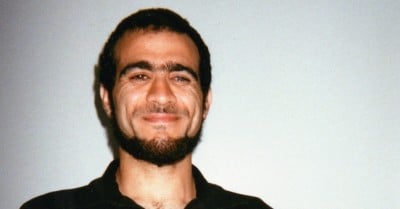Omar Khadr Arrested and Detained in Guantanamo. Timeline

This article (undated) includes a summary and timeline from 2002 to 2007
Omar Khadr is a Canadian citizen born in Ottawa, Ontario in 1986. Omar has been in the custody of the United States Department of Defense since he was 15 and has been detained at Guantánamo Bay, Cuba since he was 16 years old. The United States alleges that Omar’s father took him to meet Al-Qaeda leaders when Omar was ten years old, that he received military training, and fought in Afghanistan. In July 2002, Omar was captured by the U.S. military after its forces bombed and assaulted the compound in which he was living. The U.S. raid and subsequent firefight resulted in the death of a U.S. soldier and Omar being severely wounded. Thereafter, he was detained at Bagram Air Base and was subjected to cruel, inhuman, and degrading treatment and torture.
At the age of 16, Omar was sent to the U.S. detention facility in Guantánamo Bay, Cuba. While detained, Omar was subjected to excessively harsh interrogation methods in violation of international law, including: shackling in painful stress positions for hours on end; beatings by guards; express threats of rendition to third countries for the purposes of torture; solitary confinement for lengthy periods; and confinement in extremely cold cells. While other minors at Guantánamo were segregated from the adult population and ultimately repatriated, Omar has never received anyage-appropriate treatment. In nearly five years of imprisonment, Omar has only once been permitted contact with his family.
In November 2004, pursuant to an Executive Order establishing military commissions, the U.S. government charged Omar with murder, attempted murder, conspiracy, and aiding the enemy. The U.S. Supreme Court subsequently invalidated the military commissions system as contrary to U.S. law and the Geneva Conventions. In February of 2007 Omar was recharged under the new system established by the Military Commissions Act of 2006 (MCA). On June 4, 2007, those new charges were dismissed. The Military Commissions judge determined that the Military Commission did not have jurisdiction to try Omar as an “unlawful enemy combatant” based on his prior designation by the Combat Status Review Tribunal as an “enemy combatant.” This ruling The US government appealed this ruling on July 3, 2007 to a Court of Military Commissions Review, an appellate body constituted by the government in response to the dismissal of charges.
Despite having had charges against him dropped twice, Omar has been continuously held by the U.S. for nearly five years, much of it without being charged or provided access to lawyers. Moreover, it remains the position of the U.S. government that even if acquitted by a military commission, Omar could remain imprisoned at Guantánamo for the rest of his life.
Every Western democracy, except Canada, has criticized the Guantánamo detention center and the military commissions system constructed by the U.S. Moreover, the United Kingdom, France, Germany, and Australia have all applied substantial diplomatic pressure on the U.S., resulting in the release of their nationals from detention at Guantánamo. For example, British Prime Minister Tony Blair demanded and secured the release of all British nationals and non-citizen permanent residents detained at Guantánamo. British Attorney General Lord Goldsmith explained that the release of British nationals was sought because the military commissions system failed to offer “sufficient guarantees of a fair trial in accordance with international standards.” Australian Prime Minister John Howard, in the face of public outrage about the illegal detention of Australian national David Hicks at Guantánamo, intervened to negotiate a plea agreement in which Mr. Hicks, who was facing a potential life sentence, was repatriated to Australia to serve a nine-month sentence.
The military commission framework devalues Canadian citizenship by exempting U.S. citizens from prosecution for war crimes. Indeed, the U.S. Congress has determined that military commission proceedings are inadequate for U.S. citizens. Only non-U.S. nationals are subject to the jurisdiction of military commissions, leaving U.S. citizens to be tried in federal civilian courts or regular courts- martial. For example, U.S. citizen John Walker Lindh, who was captured in circumstances similar to Omar’s, was afforded the full constitutional protections of a criminal trial in U.S. federal civilian courts. Furthermore, the military commission rules prevent Omar from being represented before the commissions by Canadian attorneys.
| OMAR KHADR TIMELINE
|
|
| 19 September 1986 | Omar Khadr born in Ottawa, Ontario, Canada |
| 27 July 2002 | Omar Khadr captured by US forces in Afghanistan |
| October 2002 | Omar Khadr transferred to Guantánamo Bay |
| February 2003 | Canadian officials first interrogate Omar Khadr in Guantánamo |
| 8 September 2004 | Omar Khadr deemed ‘enemy combatant’ by Combat Status Review Tribunal |
| November 2004 | Omar Khadr charged with murder by an unprivileged belligerent, attempted murder by an unprivileged belligerent, conspiracy, and aiding the enemy |
| 8 August 2005 | Federal Court of Canada issues interim injunction prohibiting Canadian government from further interrogation of Omar Khadr |
| 29 June 2006 | US Supreme Court releases Hamdan judgment, invalidating military commission system |
| 17 October 2006 | Military Commissions Act signed into law |
| February 2007 | Omar Khadr re-charged under MCA with murder, attempted murder, conspiracy, providing material support for terrorism, and spying |
| 29 June 2007 | Supreme Court agrees to hear appeal by Guantánamo detainees Al Odah and Boumediene on denial of habeas corpus; appeal to be heard in Fall Term |
| 3 July 2007 | Government appeals dismissal of charges before Court of Military Commissions Review |
| 25 September 2007 | Court of Military Commissions Review (CMCR) ) reverses Military Commission ruling of 29 June 2007 |
| 2 October 2007 | Military Commission dismisses charges against Omar Khadr for lack of jurisdiction |

